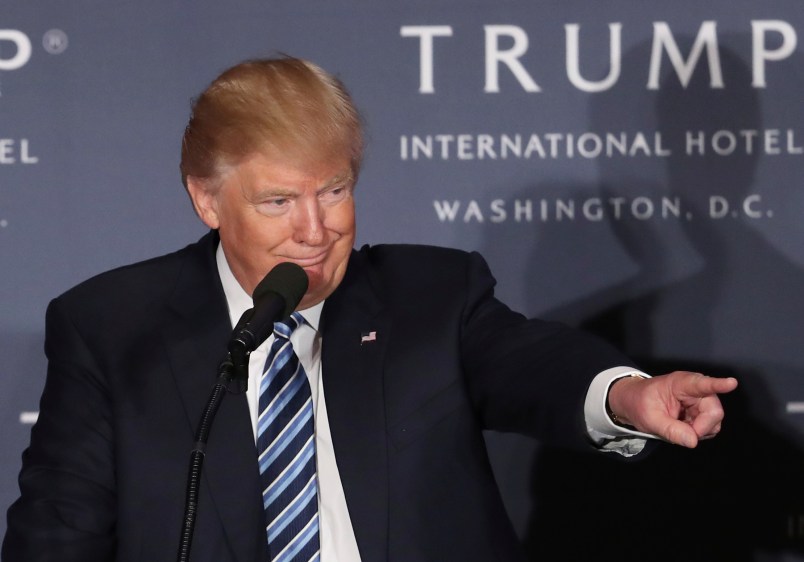President Trump’s Justice Department is scrambling to stop two state attorneys general from procuring evidence about whether the President is violating the Constitution’s emoluments clause by filing an emergency appeal in the Fourth Circuit court.
Warning that attorneys general from Maryland and DC have sent 38 subpoenas to third parties, Justice Department attorneys argue that the court needs to halt the lawsuit at the district court level before documents from those subpoenas are returned by a January 3 deadline.
Trump lost a motion to dismiss the suit at the district court level in the case, and he filed the appeal as a petition for writ of mandamus, essentially asking the Fourth Circuit Court of Appeals to override the lower court and halt the case immediately before throwing it out entirely.
DOJ attorneys argue that the state attorneys general have a “fundamentally flawed” view of the Constitution and that the lower court judge, District Judge Peter Messitte, committed a “manifest abuse of discretion” in failing to allow an appeal of his decision denying a motion to dismiss.
The brief at times exudes a panicky tone regarding the impending responses to the 38 subpoenas that have been sent in the case. Trump’s lawyers write that “plaintiffs have already propounded thirty-eight subpoenas to third parties, including to five federal agencies,” since Judge Messitte ordered discovery to begin this month.
“The President is likely to obtain mandamus, and he is likely to suffer irreparable injury in the interim from the intrusive discovery into his personal finances and the official actions of his Administration (including through third-party subpoenas of government agencies),” the filing reads.
Trump attorneys also argue that the a violation of the emoluments clause, even as alleged by the state attorneys general, doesn’t give them the right to sue to enforce it.
Through dense legalese, they argue that the plaintiffs “are asserting only a generalized grievance shared by all members of the public.” That “grievance” supposedly stems from “having an official comply with constitutional provisions adopted for the benefit of the public generally.”
Other elements of the brief descend into early U.S. history, going back to the plantations and land purchases made by the founding fathers and early presidents.
Trump attorneys cite Washington D.C. land records from 1793 to show that George Washington purchased “several lots of federal land” during his presidency, adding that “no concern was raised that such transactions conferred a benefit.”
The DOJ goes further, however, and reaches for the slave-run plantations that Washington and Thomas Jefferson ran while in office as examples how the Constitution permits presidents to run private businesses while in office.
“Several early Presidents owned plantations and continued to export cash crops overseas while in office, including Washington, who exported flour and cornmeal to ‘England, Portugal, and the island of Jamaica,’ and Thomas Jefferson, who exported tobacco to Great Britain,” the filing reads.
“Yet there is no evidence that they took steps to ensure that foreign governments were not among their customers,” the DOJ adds.
The Trump administration attorneys also make a comparison between Barack Obama’s book sales while in office and Trump’s D.C. hotel, arguing that Judge Messitte’s ruling that an emolument has to be larger than minimal payments “was created to explain away inconvenient examples like President Obama’s likely royalties from book sales to foreign governments.”
Read the brief:
Clarification: The post has been updated to more precisely reflect the argument over whether the attorneys general have the right to sue to enforce the emoluments clause.







Ooooooh! I sure am glad I am not working in the West Wing these days. I’ll bet the screaming there is supersonic. Bet the flunkies scuttle when Individual-1 (a.k.a. King Kong) stomps through.
Excuse me while I chortle.
Shorter version:
“Please stop this lawsuit before they find out how guilty he is!”
Squealing like a stuck pig
Area Man Complains Tether Ball Rules Unfair
This is comic.